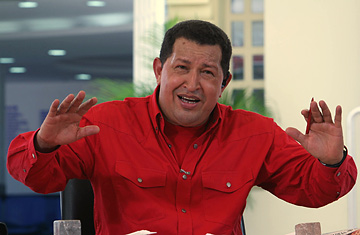
Venezuela's President Hugo Chavez speaks on his weekly radio and television show, Hello President, in Maracaibo, May 11, 2008.
Laptop computers packed with evidence allegedly tying Venezuela's leftist President Hugo Chavez to Colombia's Marxist FARC rebels pose a dilemma for the Bush Administration: The fact that the FARC is listed by Washington as a terrorist organization means the laptop data provide cause for the U.S. to add Chavez's government to its list of international sponsors of terrorism, as many conservatives on Capitol Hill are now demanding. But there are also numerous reasons the Administration could resist the temptation to turn up the heat on its most vocal challenger in Latin America.
The laptops were captured on March 1 when the Colombian army overran a FARC base in neighboring Ecuador, killing guerrilla boss Raul Reyes. Their contents, according to the Colombian government, extensively link Chavez with the rebels, even revealing an alleged Venezuelan plan to loan the FARC $250 million. Chavez denies funding the rebels and accuses Colombia of planting the laptops. But on Thursday, the Paris-based international police agency Interpol reported that its examination of the computers found no evidence that they had been tampered with. Colombia's conservative President Alvaro Uribe and the Bush Administration have issued hearty told-you-so's about Chavez and the FARC, leaving the usually hard-driving Chavez on the defensive.
"These are serious allegations about Venezuela supplying arms and support to a terrorist organization," said State Department spokesman Sean McCormack. Chavez, an unabashed FARC sympathizer, has dismissed the information from "the supposed computers of Raul Reyes" as fake. "This shameful show today," he said Thursday of the Interpol report, "is a new act of aggression."
But if the Interpol report vindicates the Bush Administration's claims about Chavez, it also raises the tricky question of how to respond. After all, Venezuela supplies almost 15% of U.S. crude oil imports, and it controls the hemisphere's largest reserves. Although such a move would probably be disastrous for his own economy, Chavez has long threatened to suspend oil exports to the U.S. if it took steps he considers aggression against Venezuela — which could include any terrorism-sponsor designation. Chavez may not follow through, but in light of the current energy crunch, few in Washington would be willing to call his bluff.
A second reason the U.S. may proceed with caution is the regional furor caused by the operation during which the laptops were captured: Colombia's incursion into Ecuador was backed by the U.S., but was branded a violation of international law by the Organization of American States, and prompted a regional diplomatic crisis that left Colombia and the U.S. isolated. As a result, much of the region feels the U.S. lacks the moral authority in this case to label Venezuela a terrorism sponsor. Even the Republican staff of the Senate Foreign Relations Committee, in a report issued last month headed up by the office of Indiana Senator Richard Lugar, advised the Bush Administration not to give Chavez the kind of anti-U.S. tool he uses so well to his favor. "If Venezuela is found to be complicit, the U.S. would be wise to allow for the regional dynamic to take its course," the report wrote. "If the U.S. reacts too strongly, attention will go from Venezuela's transgressions to yet another example of 'American intervention' and strong-arm tactics."
A terrorism-sponsor designation would also prompt Venezuela to counter more loudly with the case of Luis Posada Carriles, the Cuban exile wanted in Venezuela for allegedly masterminding a 1976 terror attack on a Cuban jetliner in Caracas, which killed 73 people. The U.S. refuses to extradite Posada despite FBI evidence implicating him in the crime. The 80-year-old, who lives freely in Miami, denies the accusations. Chavez has long argued that the Posada case proves what he calls a U.S. double standard on terrorism.
And then there's the possibility, albeit remote in the eyes of many observers, that Chavez might be right — that the laptops themselves might not be authentic. Interpol chief Richard Noble said he was "absolutely certain" that the computers "came from a FARC terrorist camp." But technically, all that Interpol did in its examination of the computers was to confirm that they had not been messed with post-March 1; it wasn't asked to investigate Chavez's allegations that the computers had been planted by the Colombian military in the first place. "The intelligence is mistaken," Venezuelan Ambassador to the U.S. Bernardo Alvarez insisted to TIME. "The evidence is a patrana — a tall tale — more anti-Venezuela propaganda from Colombia and the U.S." And the computer data itself, though certainly incriminating if true, is still open to interpretation: How much of the alleged Venezuelan support discussed in the computer documents, for example, was what the FARC was requesting rather than what Venezuela was actually willing to give? There's no doubt that Chavez has some explaining to do about the documents, but there are also doubts he can exploit.
Another incentive against raising the stakes with Venezuela is the three U.S. defense contractors who have been held hostage by the FARC since 2003. Chavez has, this year, mediated the release of a handful of high-profile Colombian hostages held by the guerrillas, and sources familiar with the case of the U.S. captives acknowledge that the Venezuelan firebrand could play a similar role in their freedom. It's an admittedly slim hope, but one the U.S. probably won't want to jeopardize at this point.
And finally, Colombia itself may not be overly enthusiastic about clobbering Venezuela with terrorism sanctions. Venezuela is still its chief trading partner — bilateral commerce shot up 25% last year — and neither nation can afford to compromise it. Chavez did call Uribe a "criminal" after Colombia's March 1 sortie, and he said Thursday that Venezuela would now "deeply review ... relations with Colombia." But Uribe directed no such remarks at Chavez. He seems satisfied that the laptops have done the talking for him.
